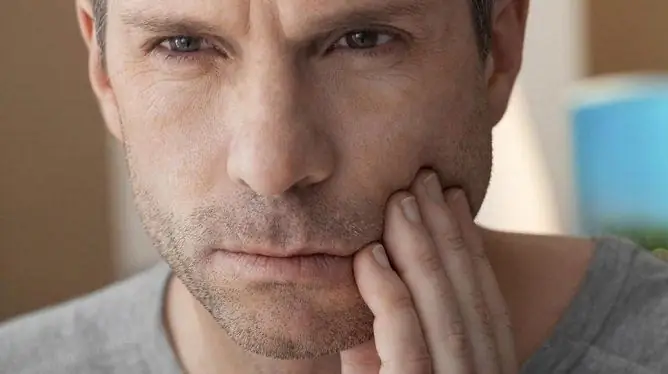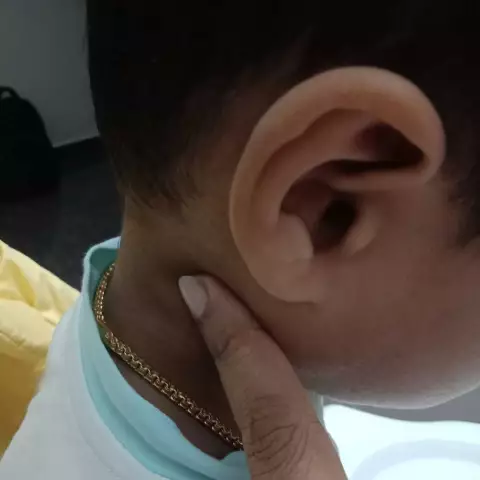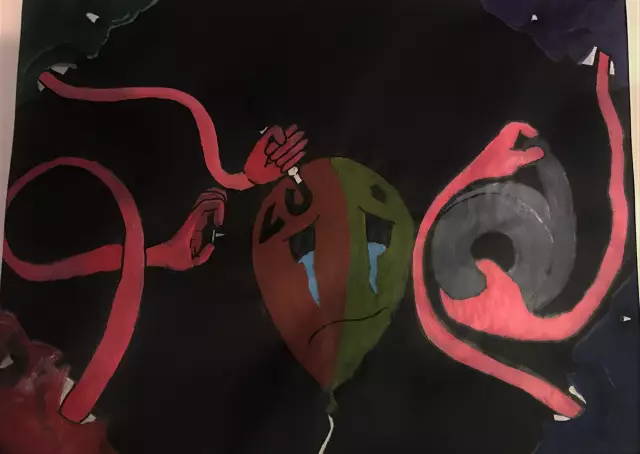- Author Rachel Wainwright wainwright@abchealthonline.com.
- Public 2023-12-15 07:39.
- Last modified 2025-11-02 20:14.
For what reason can a cheek hurt?

The cheek is the lateral part of a person's face, which is innervated by the buccal (buccal) nerve and is also the outer side wall of the oral cavity. The pain in this area can be caused by various reasons. Most often it is associated with dental diseases (caries, periodontitis, pulpitis, and others).
Why cheeks hurt
There are several reasons why your cheek may hurt:
- Sinusitis - the pain is less pronounced in the morning and worse in the evening. Unpleasant sensations are not concentrated in one place and are perceived by the patient as a general headache;
- Trigeminal neuralgia (trigeminal neuralgia) is a chronic disease that affects the trigeminal nerve, which is manifested by intense paroxysmal pain in the innervation zones of the branches of the trigeminal nerve. This disease more often affects women over 40. In this case, usually, the cheek hurts only on one side, rarely the disease affects both halves of the face. The pain is very strong, shooting, the duration of the attack is usually 10-15 seconds, but it can reach two minutes and be accompanied by uncontrolled lacrimation and increased salivation;
- Ernest's Syndrome - This condition has symptoms similar to trigeminal neuralgia. It is observed when the stylo-mandibular ligament is damaged, which connects the base of the skull to the lower jaw. In this case, the cheek, neck, face, head hurt;
- Temporal tendonitis - this disease is accompanied by discomfort that covers the teeth, cheek and neck area;
- Diseases of the teeth - neglected caries, pulpitis or periodontitis often lead to the fact that the cheek from the side of the damaged tooth is very sore.
Swelling of the cheek
Most often, cheek pain is associated with teeth, but situations are also possible when the cheek is swollen and the tooth does not hurt. This may be due to ear disease or inflammation of the parotid gland, so several specialists may need to be consulted to determine the true cause of the swelling of the cheek.
It should be remembered that swelling of the cheek, even if there is no pain, is a reason to consult a doctor. Inflammatory processes in the body can develop very slowly, but when the disease is started, it is much more difficult to cope with its consequences.
What to do when your cheek hurts
To find out why your cheeks hurt, you first need to contact your dentist. If the reasons that caused the discomfort are not related to the teeth, he will refer you to an otolaryngologist or neurologist for examination.

Treatment for cheek pain depends on the underlying cause. If the cheek is swollen as a result of the flux, surgery will be required. For the treatment of inflammatory diseases, doctors prescribe antibacterial drugs, pain relievers, as well as agents for local therapy: cold compresses, gargles, etc.
Pre-medical measures
In the event that the cheek hurts, before the visit to the dentist, you can take some measures that will alleviate the condition:
- Apply ice, cold compress, or bandage to the affected area;
- Take an analgesic;
- Rinse your mouth 3-4 times a day with a warm solution of antiseptic drugs, a solution of salt or a decoction of herbs that have an anti-inflammatory effect.
In no case should warming compresses be applied to the painful area, as this can provoke the onset of a purulent process. Also, you should not take antibiotics without a doctor's prescription.
To prevent pain in the cheek, good oral hygiene should be followed. In the cold season, it is important to keep your face warm, as hypothermia can provoke sinusitis and other inflammatory diseases of the ear, throat and nose.
YouTube video related to the article:
Found a mistake in the text? Select it and press Ctrl + Enter.






